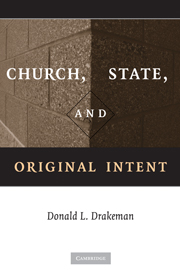Book contents
- Frontmatter
- Contents
- Preface
- 1 Introduction
- 2 Reynolds: The Historical Construction of Constitutional Reality
- 3 Everson: A Case of Premeditated Law Office History
- 4 The Battle for the Historical High Ground
- 5 Original Meanings: Where Is the Historical High Ground?
- 6 Incorporating Originalism
- 7 Conclusion
- Bibliography
- Index
7 - Conclusion
Published online by Cambridge University Press: 05 June 2012
- Frontmatter
- Contents
- Preface
- 1 Introduction
- 2 Reynolds: The Historical Construction of Constitutional Reality
- 3 Everson: A Case of Premeditated Law Office History
- 4 The Battle for the Historical High Ground
- 5 Original Meanings: Where Is the Historical High Ground?
- 6 Incorporating Originalism
- 7 Conclusion
- Bibliography
- Index
Summary
The Clause That Didn't Bark in the Night
“Is there any other point to which you would wish to draw to my attention?”
“To the curious incident of the dog in the night-time.”
“The dog did nothing in the night-time.”
“That was the curious incident,” remarked Sherlock Holmes.
In the two-hundred-year quest for the original meaning of the establishment clause, all of the various commentators – historians, judges, lawyers, political scientists, and the like – have poured out thousands of heavily footnoted pages divining the meaning of a remarkably small documentary record. It is not for lack of attention, then, that there are such enduring constitutional controversies over the meaning of fairly simple words such as “an” and “respecting,” a situation that hardly bodes well for our ability to resolve disputes over genuinely challenging concepts such as “establishment” and “religion.”
One of the reasons these debates seem so unending and irresolvable is that we have been ignoring the best evidence of what the founding generation thought about the establishment clause. This information is missing because we have been making the mistake of treating the sources much as New Testament scholars look at the limited cache of documents that survive from the times of Jesus and the early Christian churches: That is, maybe there are gospels yet to be seen, much as the Gospel of Judas burst upon the scene fairly recently, or perhaps the archaeologists have finally found them all – either way, scholars have no choice but to try to interpret the meaning of the few sources that do exist in light of the fact they may never know what the complete documentary record looked like.
- Type
- Chapter
- Information
- Church, State, and Original Intent , pp. 326 - 346Publisher: Cambridge University PressPrint publication year: 2009



